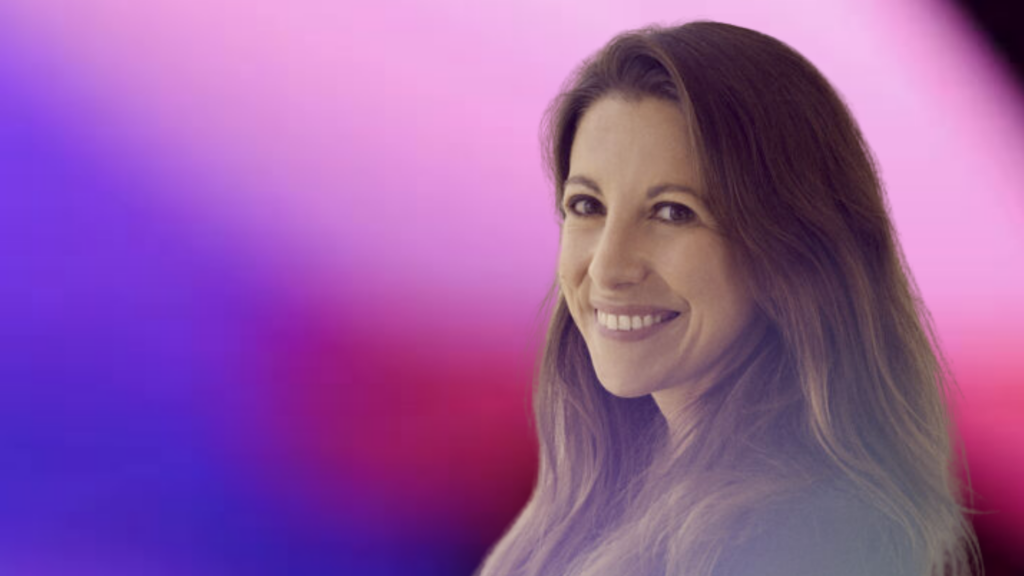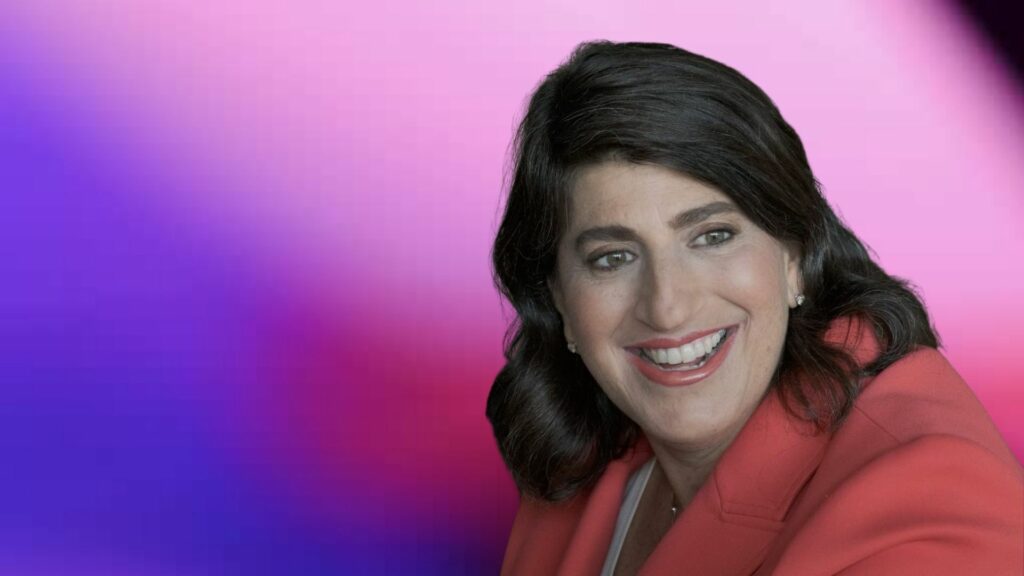Why this stock educator is investing in women’s financial futures

67% of women are now investing outside of retirement, compared to 44% in 2018, according to Fidelity’s 2021 Women and Investing Study.
That’s great news, but lower wages and a lack of confidence continue to hurt women’s ability to succeed as investors. Less female visibility in the investing space can also contribute to an overall lack of confidence, though many are working to change that – have a listen to MBAchic’s Breaking into Fintech conversation – there’s still a lot of progress to make.
As of 2021, Fidelity reports that only 33% of women actually see themselves as investors. And only 42% feel confident in their ability to save for future milestones like retirement.
If Mabel Nuñez can change that statistic, she knows she’s doing her job. As the founder and CEO of stock market education company Girl$ on The Money, Mabel’s passion for stocks and investing blossomed as an undergrad. It inspired her to pursue her MBA which she completed with honors in the spring of 2014. After spending nearly a decade working for Fortune 500 insurance companies, Mabel pivoted to focus fully on stock analysis, running her business, and publishing books centered around investing.
A proud Latina born in the Dominican Republic and raised in New York, Nuñez says it’s a rarity for people of color to grow up being exposed to personal finance. “I would say I got lucky with my dad,” she says. “He’s that kind of serious person who’s a type A personality to the T and he’d teach me what he knew about personal finance.” Inspired by her passion to soak up all the knowledge she could about investing and sharing that knowledge with others, Nuñez wants other Latinas and women in general – to know they are not alone on their personal financial education journeys.
“Just know you have other people out there that can help you, that can guide you…find ways to get educated, it’s possible for you to be the first person in your family to build an emergency fund, to start investing, to not have credit card debt,” she says.
MBAchic sat down with Nuñez to learn about her passion for investing, her advice to those pursuing their MBAs (in finance and beyond) and her advice to make investing more accessible for underrepresented communities like the one she grew up in the Bronx.
FULL TRANSCRIPTION BELOW
(has been lightly edited for clarity)
Torri Singer: (00:04)
Okay, so let’s get started. So, hey everyone. I am Torri Singer. I’m a reporter for MBAchic. I’m joined by Mabel Nuñez, investing educator and founder and CEO of Girl$ on the Money. Mabel, thank you so much for joining us. We’re so excited to talk to you today.
Mabel Núñez: (00:21)
Hi, Torri. I’m excited to be here. So thank you for inviting me and excited to share with the MBAchic community. Thank you.
Torri Singer: (00:28)
Absolutely. Thank you so much. So we’re going to talk a little bit in a minute about your own MBA experience, which I know was really formative to you. But first let’s get into Girl$ on the Money. So of course, you’re the founder and it was founded back in 2014, which is the same year that you graduated with your MBA in finance. So talk to us about Girl$ On the Money and a little bit about how the power of understanding investing changed your life and inspired you to help and change other people’s lives.
Mabel Núñez: (00:58)
Yeah, thank you. Great question. So I first discovered the whole investing world thing when I was, uh, senior in college, which was way before 2014, many years before. I don’t wanna age myself. But then I became obsessed with the whole concept of investing because, well first of all, my professor at the time explained how anybody with any type of income could buy stock in amazing companies and grow their wealth through doing that. And I was just very impressed by that and, and wondering if that was true or not. And then several years later I started to invest on my own. Around 2008, that’s when I started to invest outside of a 401k because when I started my first job out of college, when I was 21, I did contribute to my 401k.
Mabel Núñez: (01:45)
But in terms of investing myself in stocks and funds, that didn’t start until 2008. As maybe some of you guys know, that was the year that the whole market crashed. And it was back towards the end of the year. But, it turned out to be a blessing. I say this on my social media all the time. It was a time when I was able to invest for very cheap and buy all these amazing stocks. Then fast forward, it wasn’t right away that I realized how powerful investing was. Right away I noticed how fast my money would grow, like my stock goes up $50 or $30, within a month or something like that, even though that wasn’t sustainable, you know, I’m more of a long term investor.
Mabel Núñez: (02:32)
I did notice those types of things. So that caught my eye. But then it wasn’t until maybe five years later oror a little bit longer that I saw, wow, this is incredibly powerful. I can see why people say that you can build wealth over time through investing. And it got to a point where, as you said in 2014 when I decided to build Girl$ on the Money, the reason why I was able to just leave my full time job behind or not seek a career after my MBA in terms of working at an investment bank or working for somebody else, was because I got to a point where my savings and investments, allowed me to just do my own thing. So that was one of the examples that I realized wow, this is really powerful.
Mabel Núñez: (03:16)
I was able to grow my money to the point that I was able to reach a level of freedom that maybe I wouldn’t have been able to reach had I just been saving my money or, you know, not investing it. So that kind of fueled my passion to build the Girl$ on the money business, teaching other people how to do it on their own as well. Because I’m speaking from experience it’s something that I’ve done myself. So I wanted to teach others how to do it themselves too.
Torri Singer: (03:42)
Thank you so much for that context. Really helpful. And I know you’ve been able to help so many people, not just women, primarily women, but men too. So talk a little bit for our community about how achieving your MBA has influenced your own career and success. Uh, I’m sure some of the tools that business school gave you became incredibly important in your current role. Do you have any advice for other women maybe considering going for their MBA?
Mabel Núñez: (04:12)
Yeah, for sure. So I would say, have a clear idea of how the MBA is going to help you in your career or whatever it is that you want to do. For me, I went into the MBA with the idea that yeah, I want to work in finance. Finance was my passion. Since I discovered the investing world, I’m like, Oh, I want to work for an investment bank. I want to work on Wall Street. I needed an MBA for this but I wasn’t really specific about, you seeking connections or networking with people that were in that field or having a clear plan of, Okay, I’m going to get my MBA by the time I have my MBA, I’m going to have all these interviews lined up. I’m going to have these connections lined up.
Mabel Núñez: (04:57)
I didn’t have that clear path. So I will say that anybody that’s pursuing an MBA or just thinking about that, have a clear idea of, you know, how you plan to take advantage of that degree because it is expensive and it is time consuming. I didn’t have a life for four and a half years, and I say that because I went to school part-time. I know some people do their MBA full-time, they go away for two years and they’re done. I was working full time, at the same time, I was doing my MBA, so I had no life for four and a half years. I was just going to work, going home and just doing my homework. Because of that, I didn’t have the time or the inclination or the energy to go do connections with people in my MBA school or outside of it.
Mabel Núñez: (05:45)
So I would say have a clear path of how is that MBA going to help you because you don’t want to just graduate and be like, Okay, now what? I have this degree now I have to go out and seek internships or whatever. I don’t want to say it’s too late, but you’re at a better advantage if you start during your MBA career. And I will say another thing, this is probably common sense to many, if you can get your employer to pay for it, even better. My employer at the time did pay for a bulk of my MBA. So that was really helpful financially, even though I did have to pay a bulk of it myself.
Mabel Núñez: (06:28)
And I would say with professors, they’re going to help you go through difficult courses. For me, courses like accounting and some of my finance courses. You might feel really depressed at some point, like, am I going to pass this class, am I going to fail this class. But the professors are there to help you, that’s their job. So I would say if you’re ever going through a difficult course, go to your office hours, show your face, show that you care. Speaking from experience, I had a class that I thought I was going to fail, I was getting thirties on my tests. It was crazy, but I went to office hours and I spoke to the professor, he saw my face, he saw that I cared about passing the class and he ended up passing me.
Mabel Núñez: (07:12)
I ended up doing better in the class, but I think the fact that I went to talk to him and showed that I wasn’t just one random name on his list, that I cared about doing well in his class — he gave me a chance. So, you know, just keep those things in mind as you start your MBA career. Those things helped me get through the whole program because it is intense, it can be really difficult to get through all the classes and all those years of education. So, just consider that.
Torri Singer: (07:50)
Thank you so much. Yeah, so really investing in building those connections since those networking and also the relationships with your professors is really crucial. So thank you for that. I wanted to dive a little bit into your own background. So you are a proud Dominican immigrant with Hispanic Heritage Month wrapping up, I wanted to ask you, can you describe what your hope is for other Latino women out there about the value of investing? I’ve heard you speak about your father and your family and being very adamant about paying off credit cards, things like that growing up. And that obviously made a big impact in your life and your career trajectory. But, you know, not everyone does have that, that amazing core value of families and parents instilling them with financial advice. So do you have advice for other Latino women out there?
Mabel Núñez: (08:39)
Yeah, absolutely. For Latinas and people of color, minorities we’re not really exposed to, first of all, personal finance, it is rare. It’s a rare topic in our family circle for most people. I would say I got lucky with my dad, he’s that kind of serious person who’s type A personality to the T and he’d teach me what he knew about personal finance. Nothing about investing, just saving and credit cards and stuff like that. But I would say that’s a rare thing across the board, within our communities. Um, so I would say, just know you have other people out there that can help you, that can guide you. There’s books out there that can educate you on personal finance topics or investing topics.
Mabel Núñez: (09:34)
Just find ways to get educated, it’s possible for you to be the first person in your family to build an emergency fund to start investing, to not have credit card debt. You don’t have to be the statistic of your family just because, ‘oh my family, they all have debt, they all have crazy card payments, you know, they all live paycheck to paycheck’. You don’t have to be that person. You can be the outlier and you can go back and kind of teach by example. Not forcing people to do anything because sometimes people get offended. When my family or my cousins noticed that I was investing or that I was good with saving money, they started to ask me questions and I would help them out by not telling them what to do.
Mabel Núñez: (10:19)
Just offering guidance by being an example. You can be different. You don’t have to follow the same norm that your family has followed for many generations. Unfortunately that’s something that’s very common in our communities. I’ve lived it. I’ve lived in it and my friends, family members, I’ve seen it, seen how it’s not the normal thing to be educated when it comes to money. So, but we can break that barrier. You don’t have to be stuck in that cycle forever.
Torri Singer: (10:51)
That’s so true. It’s so important too, and it’s a good lesson to share I think with everybody listening. I know that you grew up in the Bronx, you’re very passionate as you kind of just described about making investing accessible for underrepresented communities. So can you further kind of speak to if someone in our audience maybe is feeling discouraged on the outside, in the peripheral of the investing or finance world, do you have any words of encouragement to say, you know, that you belong in this space as well?
Mabel Núñez: (11:32)
Yeah, absolutely. I would say, why are you discouraged? If you say that you think you don’t have enough money to invest, you say that you feel that you have a lot of debt or maybe you feel that this is too difficult. Whatever it is, those are all excuses in this day and age, especially 2022, for those that don’t know, investing has never been this accessible. Back in the day there was a lot of red tape. Either you had to have a minimum amount to invest, you know, thousands of dollars in order to even open an investment account or you’d have to go through your bank or through a financial advisor. That’s no longer the case. Anybody with any income, even if you say, Okay, I only have $50, what am I going to do with that?
Mabel Núñez: (12:18)
You can do a lot. You can open your investment account and start building from there. That wasn’t accessible to us back in the day. So I want people to understand, my people or people in general watching this or listening to this or reading about this that, there’s really no excuse whatsoever, just get started to get your foot in the door. But I would say that before you start participating in the markets, it’s incredibly important to get educated. First and foremost, unfortunately the world of investing in finance has a lot of scams, has a lot of people telling you that you can get rich overnight building all these crazy dreams or whatever, that’s not true.
Mabel Núñez: (13:06)
So you’ve got to be very careful. You have to invest in educating yourself on what investing really means, what investing is all about. It’s not a casino, it’s not an overnight thing where you’re going to make a quick buck. It’s not a system where you’re going to invest to pay off your debt. It doesn’t work that way. There’s steps that you have to take. But after that, just know that it is for you, it’s accessible. You don’t need to have a lot of money, you don’t need a middle person, you don’t need a financial advisor, you don’t need anything in this day and age to start participating. You just have to know what you’re doing in order to take those first steps. And it’s not difficult, it’s a skill, like any other skill that you can learn.
Torri Singer: (13:55)
So no excuses, it’s 2022, everyone can get involved. I love that mentality. So what are your top money management tips for anybody out there who is in the beginning stages of investing?
Mabel Núñez: (14:10)
There’s steps that you have to take before you jump into investing. And that’s something that I emphasize in my platform, in my content all the time. It might not sound exciting to a lot of people, but I would say have an emergency fund first and foremost, preferably in an online savings account because they give you the best interest rates. An emergency fund is incredibly important because emergencies happen, out of nowhere. You have to have some money stowed away to take care of that. And the standard amount is maybe three to six months of living expenses. But just start somewhere, stowing money away for emergencies. Try to get rid of your credit card debt as much as possible with your consumer debt.
Mabel Núñez: (14:57)
It doesn’t make sense to start investing when you have a lot of debt, only because the interest rates on credit cards and those types of consumer debt are astronomical, it’s like 18%, 20% even higher now that the Federal Reserve increased rates, those rates are even higher for credit cards. So even if you’re making money in the markets here and there, everything’s going to be negative by the fact that your debt is growing as astronomical payments. So get rid of that as much as you can before you start investing. And I would say if your employer offers a 401K plan or some retirement plan where you can contribute every paycheck, even better if they have a match because you’re getting free money.
Mabel Núñez: (15:47)
So participate in that, even if you don’t have a match, because that’s an automatic way for you to start investing money without even thinking about it… then after your foundation, you have your savings, you paid off most of your credit card debt or your consumer debt, then I would say start putting money away in an investment account. And you know, even if you don’t start investing just yet, maybe you want to get educated first before you get started.
Mabel Núñez: (16:31)
It’s always a good idea to have that account there open, send some money there, $50, $10, whatever it is. Maybe the ideal way would be that you automatically send money there every two weeks whenever you get paid every month. So that way by the time you are ready to start taking those first steps with investing, you already have your account open, you already have money there. I would say those are some steps that I would take just to get started on that journey.
Torri Singer: (17:03)
Thank you. That’s great advice and, and a good reminder too about the scams out there and just being aware not to have unrealistic expectations with your investing and to really be grounded in what your goals are, wiping out that, that debt you might have in advance and just getting kind of really strict with your finances before you dive into investing. So it’s an exciting place to be, but you have to do a little bit of work to get there. Mabel, thank you so much again for your time and your insight. You have such valuable lessons to share with so many people and, uh, we really can’t wait to continue the conversation with you, um, and with the MBAchic community in the future.
Mabel Núñez: (17:44)
Thank you Torri, it was my pleasure to be here with you, so I’m excited. Any questions you guys can reach out to me and I’ll be happy to help anyone out there.

Photo by Charles Deluvio







